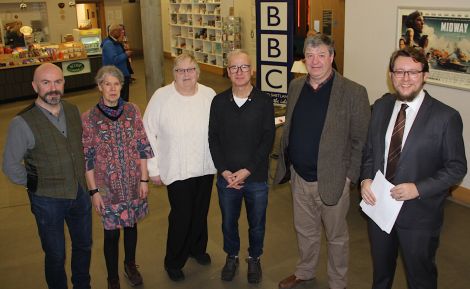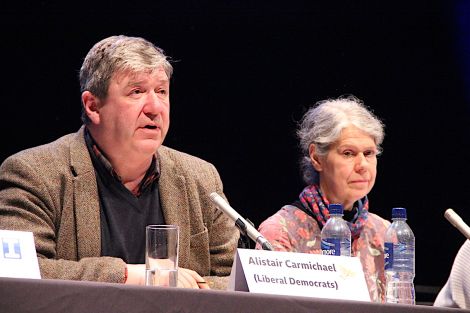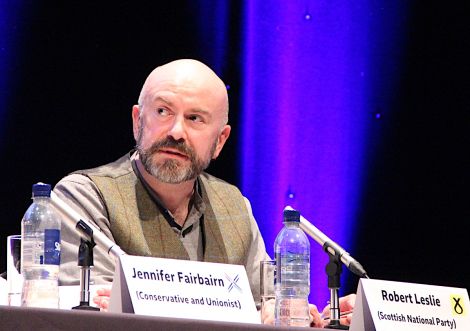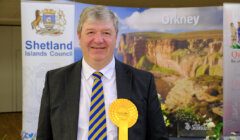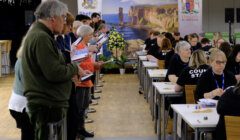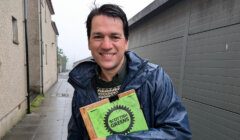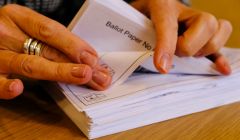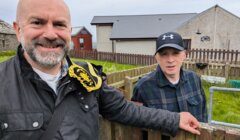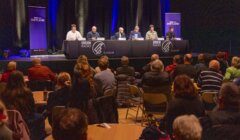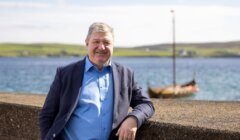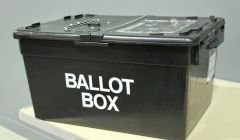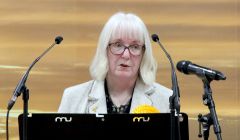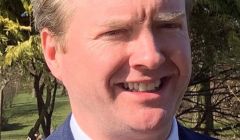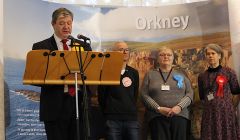Election / Candidates meet at Mareel for BBC hustings
MONDAY night’s BBC Radio Shetland hustings with five of the six candidates vying to represent Orkney and Shetland at Westminster was a curious experience in that all five agreed on most of the topics raised by the audience.
Apart from Brexit and Scottish independence, of course, independent David Barnard, Alistair Carmichael for the Lib Dems, Coilla Drake for Labour, Tory candidate Jennifer Fairbairn and SNP man Robert Leslie all principally agreed that Gina Miller’s successful court actions that forced the government to give parliament the final say on Brexit as well reversed this autumn’s long prorogation of parliament was to be applauded.
Brexit Party candidate Robert Smith was fishing and didn’t make it to the meeting.
The rarely witnessed unity continued when the candidates were asked about ‘Settled Status’, the registration process EU citizens have to go through to be able to continue living in the UK following Brexit, voting rights for EU citizens and the need to reform the way we vote to make parliament more representative of the peoples’ will.
All agreed that the ‘Settled Status’ process was “drastically unfair” (Leslie) and “despicable” (Drake), was sending out all the wrong signals (Carmichael) and “bordered on racism” (Barnard).
Fairbairn, the Tory candidate, went as far as saying the UK’s voting system needed “sorting out” and added that she thought EU citizens should have a vote if they live and work in the UK.
Carmichael meanwhile described the first past the post voting system as a “dreadful” set-up that “never produces representative government”, while Drake believed that proportional representation would empower people
Barnard, who stands on the single issue of abolishing the monarchy, said to a round of applause that the Home Office should be subject to the same “root and branch reform” he would prescribe to the UK monarchy.
Become a member of Shetland News
When host Daniel Lawson pointed out to Jennifer Fairbairn that she had already three times voiced a view that was in stark contrast with her party’s manifesto pledges, she responded saying that it was important to have one’s own views.
The differences finally showed when candidates were asked about the hated Common Fisheries Policy (CFP), one of the main reasons why many islanders – and particularly those working in the fishing industry – are in favour of ‘getting Brexit done’.
Fairbairn said that “the sooner we leave the better”, and with that the CFP, because “we need to leave the EU to protect our way of life”.
Leslie, meanwhile, told the audience the Scottish Government had already urged Westminster for it to represent the UK at the end of year fish quota negotiations as, in all likelihood, there would be no functioning UK government in place at the time of these important EU talks.
Carmichael advocated reform of the CFP, including regional management, decentralisation and greater influence for fishermen on setting fishing entitlements. He said he could fully understand why the catching sector wants to leave the EU but he warned that this was “not the panacea that they are told it is”.
The question on Scottish independence created the usual spat between nationalists and unionists, not so much among the candidates, but by a comment from the audience directed at Lib Dem candidate Alistair Carmichael.
Responding to a claim that 300 years of the union were 300 years of suppression Carmichael said that over the centuries Scots had contributed and benefitted from the union and added that in recent times many Scots had been at the heart of UK government.
Should there be a majority for independence in a second Indyref, Carmichael predicted “that the problems of Brexit will become the problems of independence”.
Robert Leslie described the time since the last referendum in September 2014 as a “succession of broken promises” during which Scotland has been silenced.
Drake said her party had a clear policy should Labour win next week’s election and be able to form a transformative government: sort Brexit and see how people feel about the consequences before allowing a second Scottish independence referendum within five years of coming to power.
Candidates agreed that the way the state pension age had been changed for women born in 1950s needed further attention and funds to compensate for the unfairness imposed.
While both the Lib Dems and the Tories are waiting for the parliamentary ombudsman to publish its report into the whole saga, Labour already pledged the enormous sum of almost £60 billion over five years to compensate 3.7 million women in the UK.
And then there was a question about the controversial Viking Energy wind farm project.
“Is Viking the price we have to pay for the climate?” Chris Brown asked, reminding everybody at Mareel that climate change was the real issue and very little had been said about it.
And, surprisingly, no-one was in favour, despite the promise that up to 600MW of renewable energy could be sent down the cable to the UK mainland should the transmission link ever be built.
Drake said Labour would take the national grid into public ownership and as such remove the pressure of developing mega project to justify the construction of a transmission cable.
Orkney, she said, produces 110 per cent of its electricity with small projects earning income for communities.
Fairbairn was against it because the wind farm would destroy Shetland, adding that peat bogs holding the carbon should not be dug up.
Carmichael said the UK needed to increase the amount of electricity it produces but felt that “any community should never feel something is forced upon them”.
SNP candidate Leslie also spoke in favour of disconnecting the transmission cable from the projects that are supposed to trigger the cable. When it comes to electricity networks, he said, Orkney and Shetland were always at the end of the queue. Local energy plans could help overcome that disadvantage, he said.
It has often been said that due to the first past the post voting system a UK general election is in fact 650 individual contests on a constituency level.
Of those around 500 will return the same party (and often the same MP) to parliament with a huge majority. This leaves just 150 constituencies where the outcome of the election is decided. There is little to suggest the Orkney and Shetland constituency could be one of them.
The hour-long hustings will be broadcast on Radio Shetland after the 6pm news on Tuesday evening and is also available on station’s mixcloud service below.
Become a member of Shetland News
Shetland News is asking its readers to consider paying for membership to get additional perks:
- Removal of third-party ads;
- Bookmark posts to read later;
- Exclusive curated weekly newsletter;
- Hide membership messages;
- Comments open for discussion.
If you appreciate what we do and feel strongly about impartial local journalism, then please become a member of Shetland News by either making a single payment, or setting up a monthly, quarterly or yearly subscription.






